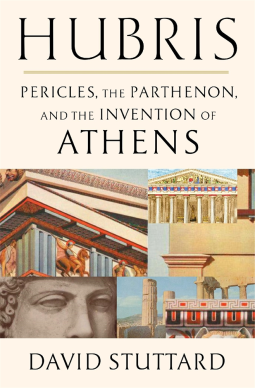Hubris
Pericles, the Parthenon, and the Invention of Athens
by David Stuttard
You must sign in to see if this title is available for request. Sign In or Register Now
Send NetGalley books directly to your Kindle or Kindle app
1
To read on a Kindle or Kindle app, please add kindle@netgalley.com as an approved email address to receive files in your Amazon account. Click here for step-by-step instructions.
2
Also find your Kindle email address within your Amazon account, and enter it here.
Pub Date Mar 17 2026 | Archive Date Mar 17 2026
Harvard University Press | Belknap Press
Talking about this book? Use #Hubris #NetGalley. More hashtag tips!
Description
A new perspective on ancient Athens at the height of its powers, reinterpreting the city’s supposed “Golden Age” as a period of ruinous culture wars.
The age of Pericles, in the fifth century BC, is often described as the Golden Age of Athens. The city witnessed a flowering of philosophy, art, and architecture—including an ambitious building program, with the Parthenon its centerpiece. But as David Stuttard shows in this vivid account, the seemingly triumphant city was in fact riven by conflict and contradiction. Though nominally a democracy, Athens led a tyrannical empire. And for Pericles and his circle, the Parthenon was less a holy place than a propaganda vehicle. Its sculptures carried the message that Athenians, beloved by the gods, were nearly divine in their own right—which to many Greeks smacked of hubris.
As long as things went well, Athenian democracy appeared to prosper. But just a year after the Parthenon was finished, Athens was at war with Sparta; a plague killed a third of the population, including Pericles; and earthquakes razed much of the city. In the wake of what seemed like divine retribution, popular outrage against those accused of undermining state religion was so strong that it took the execution of Socrates to lance the boil.
Hubris offers dramatic portraits of key figures like Pheidias, who sculpted the monumental statue of Athena yet fell prey to charges of impiety; Themistocles, who built the Athenian navy but died an exile in enemy lands; and Alcibiades, the psychopathic playboy whose mercurial ego hastened his city’s defeat. To understand the Parthenon and the Athens that built it, Stuttard makes clear, we must recognize the tensions among the city’s rivalrous families, generations, and social classes, whose visions of their place in the world ultimately proved incompatible.
David Stuttard is an independent scholar, theater director, and Fellow of Goodenough College, London. He has written numerous books about Ancient Greece, including Nemesis: Alcibiades and the Fall of Athens and Phoenix: A Father, a Son, and the Rise of Athens.
Advance Praise
"A wonderful book. The rise and fall of Athens in the fifth century BC may seem familiar, but David Stuttard is a gifted storyteller and the tale is not told in the usual way. Hubris offers a cultural as well as a political and military history: Stuttard immerses us in Athenian life and shows how the Parthenon, along with other monuments and artistic productions, makes sense in the context of Athenian ambitions, hopes, and fears. Teeming with fascinating details and sparkling turns of phrase, Hubris is a sheer treat." - Robin Waterfield, author of Creators, Conquerors, and Citizens
Available Editions
| EDITION | Hardcover |
| ISBN | 9780674258471 |
| PRICE | $29.95 (USD) |
| PAGES | 368 |




